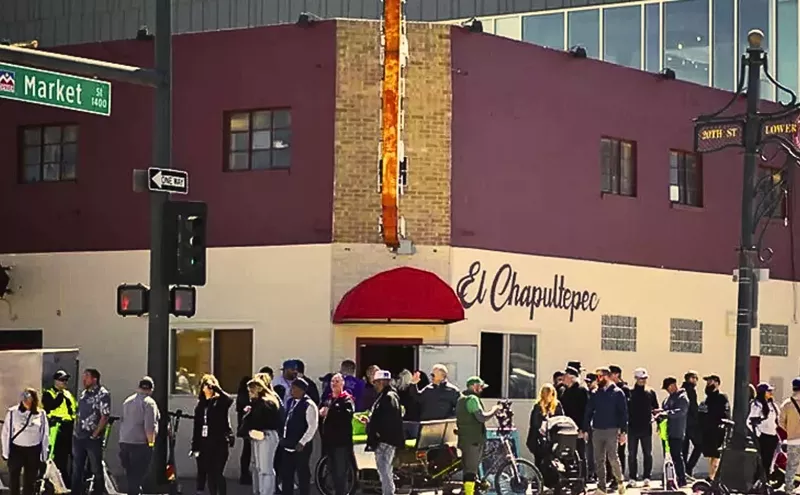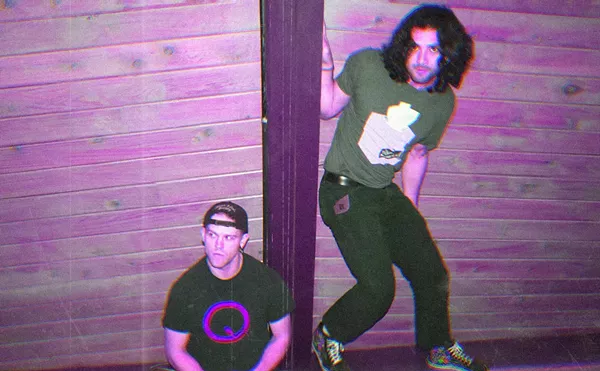During the first half of the decade, John Schmersal, the guiding light of Enon, churned out ditties so quickly that he made hyper-prolific songwriter Ryan Adams seem like a slacker in comparison. But after years of affixing fresh compositions to the band's website on practically a daily basis, he decided that he no longer aspired to be a poster boy for musical overachievement. "Who wants to be that?" he asks.
So Schmersal made some adjustments. He and singer Toko Yasuda, his Enon bandmate and significant other, moved from New York City to Philadelphia, where they purchased a house — and while they promptly outfitted the dwelling with recording gear, they also sought to strike a better balance between music and life's other attractions. "It was really a chance, an opportunity, to explore new things. Even mundane daily things," Schmersal says. "I even stopped ingesting music like music fanatics do. And that's one of my things now. I'm not obsessed with finding out about things. I let myself find out about things at my own pace. And it goes for music creating as well as music listening for me.
"I don't think it was necessarily something where I was like, 'Oh, I should really cut back on my songwriting,'" he continues. "It think it was more wanting to have the energy to do things like that instead of feeling like you had to. Enjoying it and having to enjoy something are different things."
This distinction comes through clearly on Grass Geysers...Carbon Clouds, Enon's latest release on the Touch and Go imprint. Reviews of the disc have tended to overstate the simplicity of its sound: While the recording is certainly more straightforward than previous CDs like 1999's Believo! and 2003's Hocus Pocus, "Mirror on You," "Dr. Freeze" and other highly pleasurable tracks sport production and arrangements marked by plenty of cleverness. Still, the studio shenanigans support rather than overshadow the songs, allowing the enthusiasm and exuberance of Schmersal, Yasuda and drummer Matt Schulz to come through loud and clear.
"The goal with this record was not to obsess over the recording of it — the sounds, the texture of it — and just really kind of approach it like a regular band," Schmersal confirms. "We made a record that wasn't slathered with dressing, like on every song, having so many layers to it." The project was completed in "a tidy month," he estimates, "and that's like recording the basics at a studio for two days and doing some overdubs at home in a few days — but relaxed, with many days not doing anything music-related." The breaks gave Schmersal an opportunity to indulge in some of his other current passions, which he says "are more about being at home and doing things at my home." That's an unusual confession for an indie-rock icon to make, but he feels his domesticity has paid artistic dividends. "Certainly for myself, at least, it's recharged my batteries," he notes.
Such serenity contrasts sharply with Schmersal's time in his first major band — Dayton, Ohio's Brainiac. Although not a founding member (he replaced original guitarist Michelle Bodine a couple of years after the group's 1992 genesis), he was on board for the combo's rise through one of the most exciting periods in recent rock history. He recalls a particularly memorable gig at a house party in Fort Wayne, Indiana, "where they physically tore the banister off the staircase. You're like, gosh, that doesn't really happen every show, you know?"
By the arrival of 1996's outstanding Hissing Prigs in Static Couture album (their Touch and Go debut), the Brainiac boys were on the cusp of broader stardom, with Beck and other big-name performers inviting them to open shows and several major labels bidding for their services. But as they were on the cusp of signing a contract with Interscope Records, disaster struck, literally, when lead singer Tim Taylor died in a May 1997 automobile accident. His passing spelled the end for Brainiac and the Interscope deal even as it left Schmersal's world in turmoil. He'd totaled his own car the previous week, shortly after moving to Newport, Kentucky, and as a result, he couldn't get to his day job, across the Ohio River in Cincinnati. In the briefest of moments, he went from being a budding rock star to broke, unemployed and stranded. "There were so many things happening at once," he allows, "and change caused more change."
Eventually, Schmersal headed to New York, settling in Brooklyn's Park Slope neighborhood. He had no intention of jumping into another band, but little by little, he was drawn into the area's music scene. "I had brought all these fucking instruments I'd had from being a pack rat in the Midwest," he says. "I had a lot of them at my house and dispersed them at friends' practice spaces and whatever. It was just playing with a bunch of different people at the time" — among them drummers Rick Lee and Steve Calhoon, who'd previously teamed in a well-regarded, percussion-heavy combo known as Skeleton Key. This trio formed the core of Enon on Believo!, but the lineup was short-lived. "Steve didn't end up staying in the band, or wasn't able to really tour when it started happening," Schmersal maintains.
Hence the addition of Yasuda and Schulz — but this modified roster also proved unsteady. Lee split following the appearance of another first-rate offering, 2002's High Society, and Schmersal still laments the hole his absence has left in the band. Several musicians tried out to fill the slot, but in the end, "we basically decided that we were going to finish working on the record, because we weren't finding that somebody we wanted that quickly. And there are differing levels of desire within the band as far as wanting another person or not. I feel more open about the idea of it than maybe some of the others." Indeed, he's even intrigued by the possibility of joining forces with someone who disrupts the chemistry that exists between the current threesome. "There are tons of bands that have terrible interpersonal relationships that are also great bands," he points out, laughing. "I think that's part of some bands' mojo: their hatred of each other."
These days, the main tension in Enon involves logistics; Schulz didn't follow Schmersal and Yasuda to Philly, choosing to remain in New York instead, and the distance between them cuts back on practice time. For the most part, however, Schmersal and Yasuda are reveling in their new role as homebodies. "I cooked about half the time in New York, and I cook virtually all the time now," he reports. "Food in New York is a really big deal, because it's such good food and the prices are so competitive. But I garden and do things at home now that I didn't have the space or the luxury to indulge myself in before." If he has a favorite dish, it's sautéed greens made with ingredients from his own back yard. "We grow a lot of kale and collard greens," he says. "Swiss chard. Arugula. Dandelions."
Given Schmersal's dietary preferences, his decision to sign the band up for a contest awarding $500 of free grub from Taco Bell seems a bit quizzical — and he confesses that the group's subsequent victory turned out to be a mixed blessing. On the last Enon tour, the outfit stopped at a branch of the eatery and he ordered a cup of beans and cheese — "and I totally had stomach pains afterward," he concedes. "So it's a shame. It's definitely not a great endorsement for my luxury stack, or whatever you want to call it."
Intestinal distress aside, Schmersal continues to pen tunes. Among his latest is "The Little Ghost of JonBenét," which he describes as "a song of pity" about the late Boulder tot; the number's on a seven-inch put out by a Prague imprint called Silver Rocket, and Enon will be peddling copies at tour stops. But he no longer spends every spare minute making music.
"In order to be a healthy human being," he says, "you have to do other things."
Visit Backbeat Online for more of our interview with Enon's John Schmersal.












